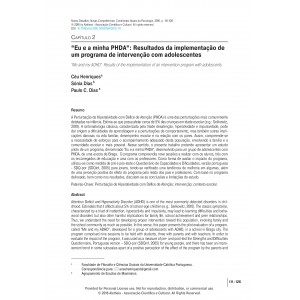American Psychiatric Association. (2013). Diagnostic and statistical manual of mental disorders (5th ed.). Washington, DC: American Psychiatric Association.
Barkley, R. (2011). Attention-Deficit/Hyperactivity Disorder, self-regulation, and executive functioning. In K. D. Vohs, & R. F. Baumeister (Eds.), Handbook of self-regulation (2nd ed., pp. 551-563). New York: The Guilford Press.
Bhering, E., & Sarkis, A. (2009). Modelo bioecológico do desenvolvimento de Bronfenbrenner: Implicações para as pesquisas na área da educação infantil. Horizontes, 27 (2), 7-20.
Bronfenbrenner, U. (1979). The Ecology of Human Development: Experiments by nature and design. Cambridge: Harvard University Press.
Bronfenbrenner, U. & Morris, P. A. (1998). The ecology of developmental process. In W. Damon & R. M. Lerner (Eds.), Handbook of Child Psychology, Vol. 1: Theoretical Models of Human Development (5th ed., pp. 992-1028). New York: Wiley.
DuPaul, G., Weyandt, L., & Janusis, G. (2011). ADHD in classroom: Effective intervention strategies. Theory in Practice, 50, 35-42.
Frame, K. (2004). The STARS Program: Social empowerment training for preadolescents with attention deficit hyperativity disorder (ADHD). The Journal of School Nursing, 20 (5), 257-261.
Gaitas, S., & Morgado, J. (2010). Educação, diferença e psicologia. Análise Psicológica, 28 (2), 359-375.
Jones, K., Daley, D., Hutchings, J., Bywater, T., & Eames, C. (2007). Efficacy of the incredible years basic parent training programme as an early intervention for children woth conduct problems and ADHD. Child: Care, Health and Development, 33 (6), 749-756.
Knapp, P., Rohde, L., Lyszkowski, L., & Johannpeter, J. (2002). Terapia cognitivo-comportamental no transtorno de déficit de atenção/ hiperatividade: Manual do terapeuta.Porto Alegre: Artmed.
Kohut, C., & Andrews, J. (2004). The efficacy of parent training programs for ADHD children: A fifteen-year review. Developmental Disabilities Bulletin, 32 (2), 155-172.
Langberg, J., Epstein, J., Becker, S., Girio-Herrera, E., & Vaughn, A. (2012). Evaluation of the Homework, Organization, and Planning Skills (HOPS) intervention for moddle school students with Attention Deficit Hyperactivity Disorder as implemented by school mental health providers. School Psychology Review, 41 (3), 342-364.
Lopes, J., Rutherford, R., Cruz, M., Mathur, S., & Quinn, M. (2006). Competências sociais: Aspectos comportamentais, emocionais e de aprendizagem. Braga: Psiquilíbrios.
Martins, E., & Szymanski, H. (2004). A abordagem ecológica de Urie Bronfenbrenner em estudos com famílias. Estudos e Pesquisa em Psicologia, 4(1), 63-77.
Martinussen, R., Tannock, R., Chaban, P., McInnes, A., & Ferguson, B. (2006). Increasing awareness and understanding of attention deficit hyperactivity disorder (ADHD) in education to promote better academic outcomes for students with ADHD. Exceptionality Education Canada, 16 (3), 107-128.
Marzocchi, G., Capron, C., Pietro, M., Tauleria, E., Duyme, M., Frigerio, A. et al. (2004). The use of the Strengths and Difficulties Questionnaire (SDQ) in Southern European coutries. European Child & Adolescent Psychiatry, 13 (supplt 2), 40-46.
Monastra, V. (2008). Social skills training for children and teens with ADHD: The neuroeducational life skills program. In V. J. Monastra (Ed.), Unlocking the potential of patients with ADHD: A model for clinical practice (pp. 197-210). Washington, DC, US: American Psychological Association.
SDQinfo. (09 de 06 de 2012). Downloadable SDQs and related items. Retirado de: http://www.sdqinfo.org/py/doc/b3.py?language=Portugueseqz(Portugal)
Selikowitz, M. (2010). Défice de atenção e hiperactividade (1ª ed.). Alfragide: Texto Editores, Lda.
Thompson, M., Laver-Bradbury, C., Ayres, M., Le Poidevin, E., Mead, S., & Dodds, C. (2009). A small-scale randomized controlled trial of the revised new forest parenting programme for preschoolers with attention deficit hyperactivity disorder. European Child & Adolescent Psychiatry, 18, 605-616.
Trout, A., Lienemann, T., Reid, R., & Epstein, M. (2007). A review of non-medication interventions to improve the academic performance of children and youth woth ADHD. Remedial and Special Education, 28 (4), 207-226.
Weijer-Bergsma, E., Formsma, A., Bruin, E., & Bögels, S. (2012). The effectiveness of mindfulness training on behavioral problems and attentional functioning in adolescents with ADHD. Journal of Child and Family Studies, 21, 775-787.









